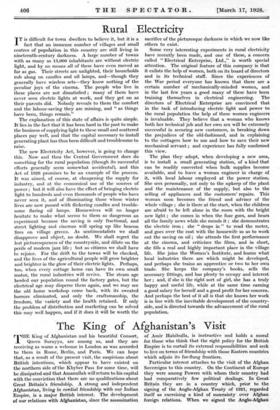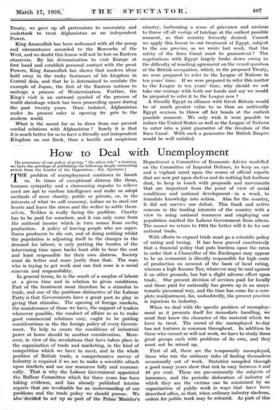King of Afghanistan's Visit
The
• •
of Afghanistan and his beautiful Consort, rEQuiCig eennSurayya, are among us, and they are receiving as warm a welcome in London as was accorded to them in Rome, Berlin, and Paris. We can hope that, as a result of the present visit, the suspicions about British intentions, which appear to have existed on the northern side of the Khyber Pass for some time, will be dissipated and that Amanullah will return to his capital with the conviction that there are no qualifications about Great Britain's friendship. A strong and independent Afghanistan, living in cordial friendship with our Indian Empire, is a major British interest. The development of our relations with Afghanistan, since the assassination of Amir Habibulla, is instructive and holds a moral for. those who think that the right policy for the British Empire is to curtail its external responsibilities and seek to live on terms of friendship with those Eastern countries whidh adjoin its far-flung frontiers.
Particular interest attaches to the visit of the Afghan Sovereigns to this country. On the Continent of Europe they were among Powers with whom their country had had ,comparatively few political dealings. In Great Britain they are in a country which, prior to the signing of the Anglo-Afghan Treaty of 1921, regarded itself as exercising a kind of suzerainty . over Afghan foreign relations. When we signed the Anglo-Afghari Treaty, we gave up all pretensions to suzerainty and undertook to treat Afghanistan as an independent Power.
• King Amanullah has been welcomed with all the pomp and circumstance accorded to the Monarchs of the West, and no doubt this lesson will not be lost on Eastern observers. By his determination to visit Europe at first hand and establish personal contact with the great Powers, King Amanullah has shown that modern ideas hold sway in the rocky fastnesses of his kingdom in Central Asia, and that he is determined to emulate the example of Japan, the first of the Eastern nations to undergo a process of Westernisation. Further, the King's visit is an outward symbol of the process of world shrinkage which has been proceeding apace during the past twenty years. Once isolated, Afghanistan under. its present ruler is opening its gate to the modem world.
What is the moral for us to draw from - our present cordial relations with Afghanistan ? Surely it is that itis much better for us to have a friendly and independent Kingdom on our flank, than a hostile and suspicious conntrY harbouring a sense of grievance and anxious to throw off all vestige of tutelage at the earliest possible moment, as that country formerly desired. Cannot we apply this lesson to our treatment of Egypt, subject to the one proviso, as we wrote last week, that the safety of the Suez Canal must be guaranteed ? The negotiations with Egypt largely broke down owing to the difficulty of reaching agreement on the vexed question of the British occupation, which, in the proposed Treaty, we were prepared to refer to the League of Nations in ten years' time. If we were prepared to refer this matter to the League in ten years' time, why should we not take our courage with both our hands and say we would be prepared to refer it to the League now ?
A friendly Egypt in alliance with Great Britain would be of much greater value to us than an unfriendly Egypt anxious to throw off her bonds at the earliest possible moment. We only wish it were possible to induce the United States as well as the League of Nations to enter into a joint guarantee of the freedom of the Suez Canal. With such a guarantee the British Empire would be well satisfied.











































 Previous page
Previous page